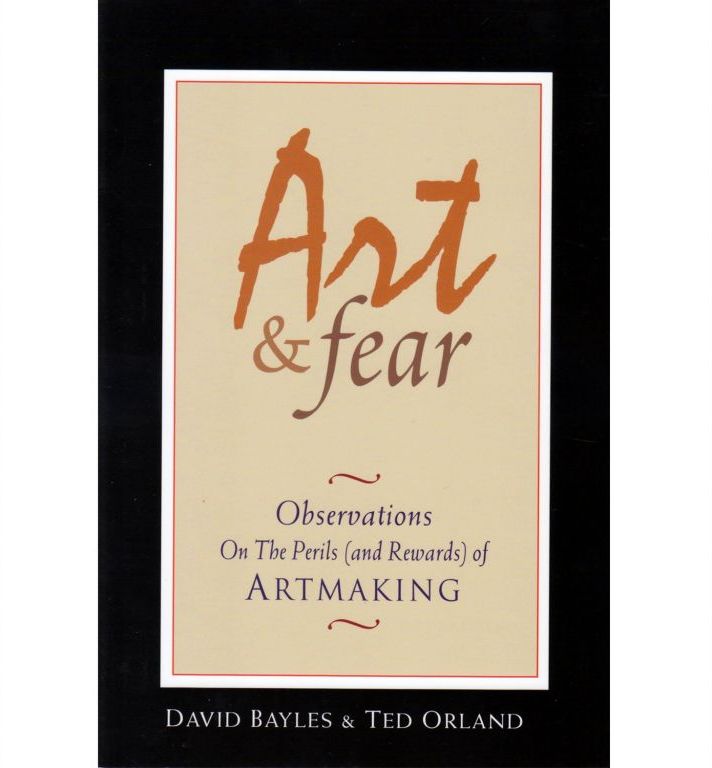| A Book Every Artist Should Own The Assignment Take the time to read the following passages from the book Art and Fear. As you read make notes in your sketchbook about which of these short passages resonates with you the most. After having read all of these, please choose ten important passages that mean the most to you and your work. Write those ten passages in your visual journal and rank them in order of their importance. Lastly, choose the most profound statement out of your list of ten, and write a paragraph about why it was so meaningful to you and be prepared to discuss your work with the class the next time we meet. The Passages: ”The function of the overwhelming majority of your artwork is simply to teach you how to make the small fraction of your artwork that soars.” Art and Fear, page 5. ”To all viewers but yourself, what matters is the product: the finished artwork. To you, and you alone, what matters is the process.” Art and Fear, page 5. ”You learn how to make your work by making your work … art you care about -- and lots of it!” Art and Fear, page 6. ”What separates artists from ex-artists is that those who challenge their fears continue; those who don’t, quit.” Art and Fear, page 14. ”Most artists don’t daydream about making great art --- they daydream about having made great art.” Art and Fear, page 17. ”The artist’s life is frustrating not because the passage is slow, but because he imagines it to be fast.” Art and Fear, page 17. “To require perfection is to invite paralysis. The pattern is predictable: as you see error in what you have done, you steer your work toward what you imagine you can do perfectly. You cling ever more tightly to what you already know you can do - away from risk and exploration, and possibly further from the work of your heart. You find reasons to procrastinate, since to not work is to not make mistakes.” “What you need to know about the next piece is contained in the last piece. The place to learn about your materials is in the last use of your materials. The place to learn about your execution is in your last execution. Put simply, your work is your guide: a complete, comprehensive, limitless reference book on your work.” “For most artists, making good art depends upon making lots of art and any device that carries the first brushstroke to the next blank canvas has tangible, practical value.” “To the critic, art is a noun. To the artist, art is a verb.” “The difference between art and craft lies not in the tools you hold in your hands, but in the mental set that guides them. For the artisan, craft is an end in itself. For you, the artist, craft is the vehicle for expressing your vision. Craft is the visible edge of art.” “Look at your work and it tells you how it is when you hold back or when you embrace. When you are lazy, your art is lazy; when you hold back, it holds back; when you hesitate, it stands there staring, hands in its pockets. But when you commit, it comes on like blazes.” “All that you do will inevitably be flavored with uncertainty—uncertainty about what you have to say, about whether the materials are right, about whether the piece should be long or short, indeed about whether you’ll ever be satisfied with anything you make. Photographer Jerry Uelsmann once gave a slide lecture in which he showed every single image he had created in the span of one year, some hundred-odd pieces—all but about ten of which he judged insufficient and destroyed without ever exhibiting.” (page 19) “If you think good work is somehow synonymous with perfect work, you are headed for big trouble.” (page 29) “Nonetheless, the belief persists among some artists (and lots of ex-artists) that doing art means doing things flawlessly—ignoring the fact that this prerequisite would disqualify most existing works of art. Indeed, it seems vastly more plausible to advance the counter-principle, namely that imperfection is not only a common ingredient in art, but very likely an essential ingredient” (page 30). “To demand perfection is to deny your ordinary (and universal) humanity, as though you would be better off without it. Yet this humanity is the ultimate source of your work; your perfectionism denies you the very thing you need to get your work done.” (page 30). |
|
0 Comments
Leave a Reply. |
Art 45
|


 RSS Feed
RSS Feed
